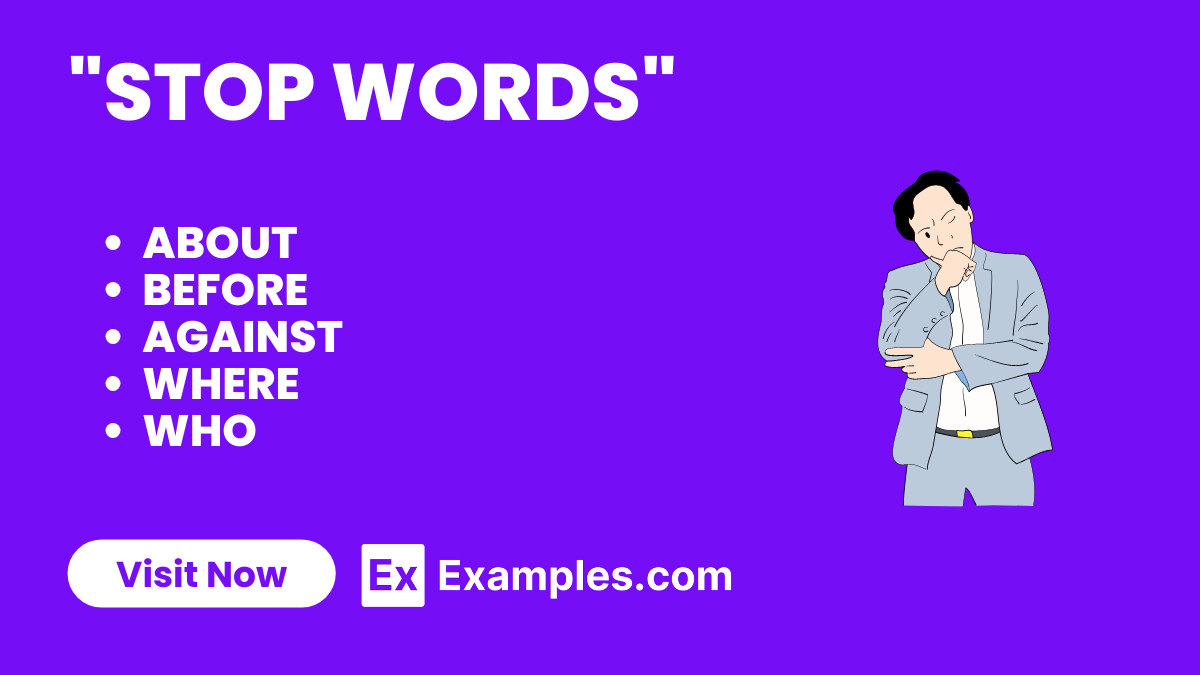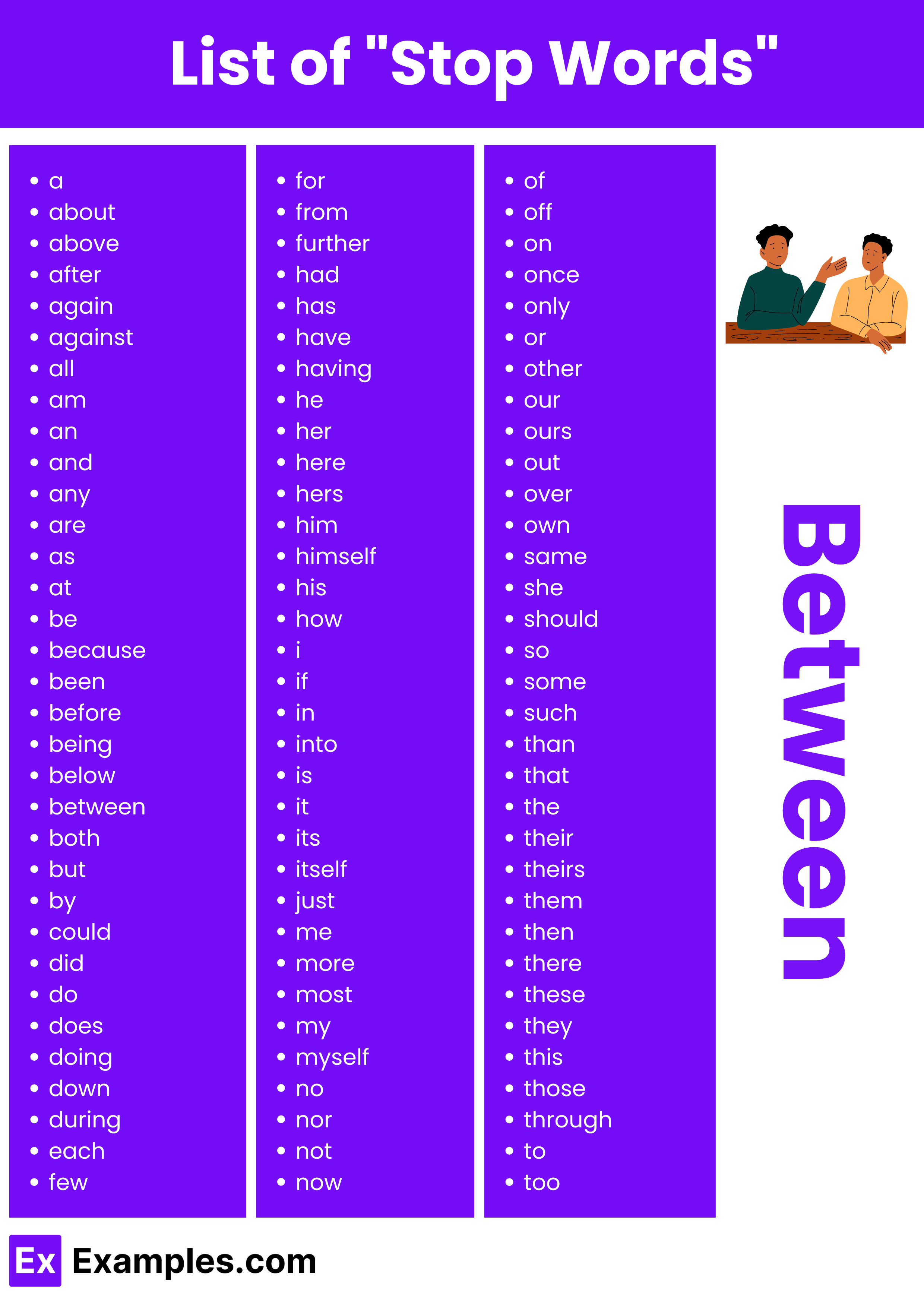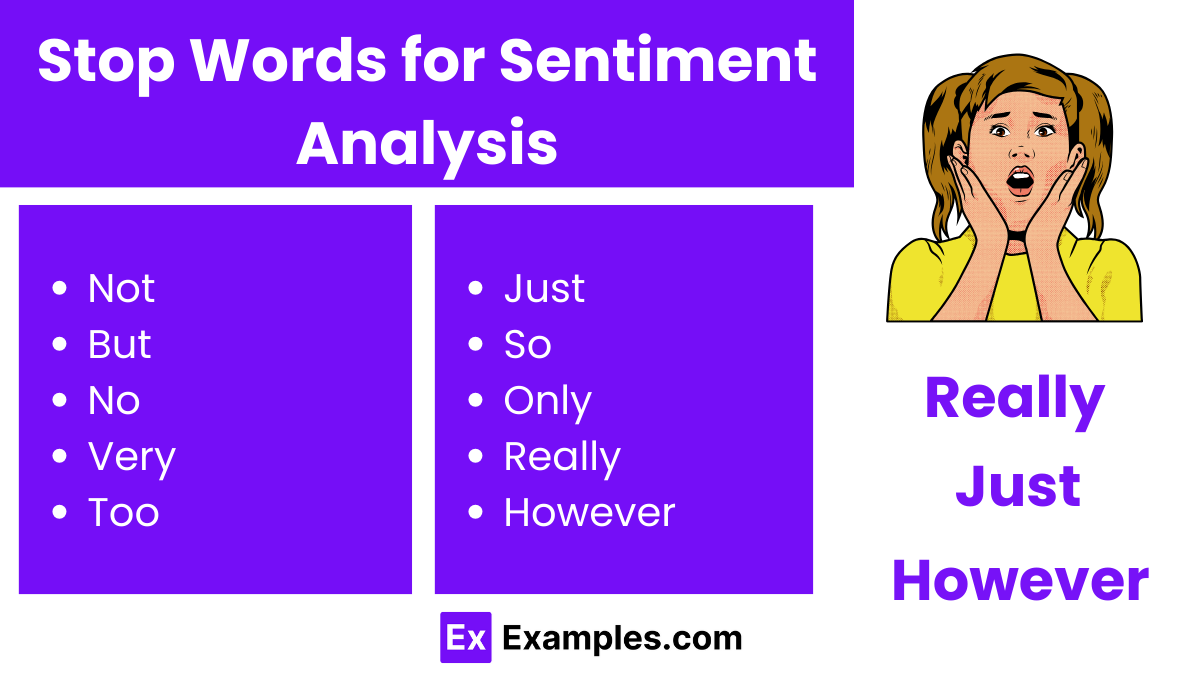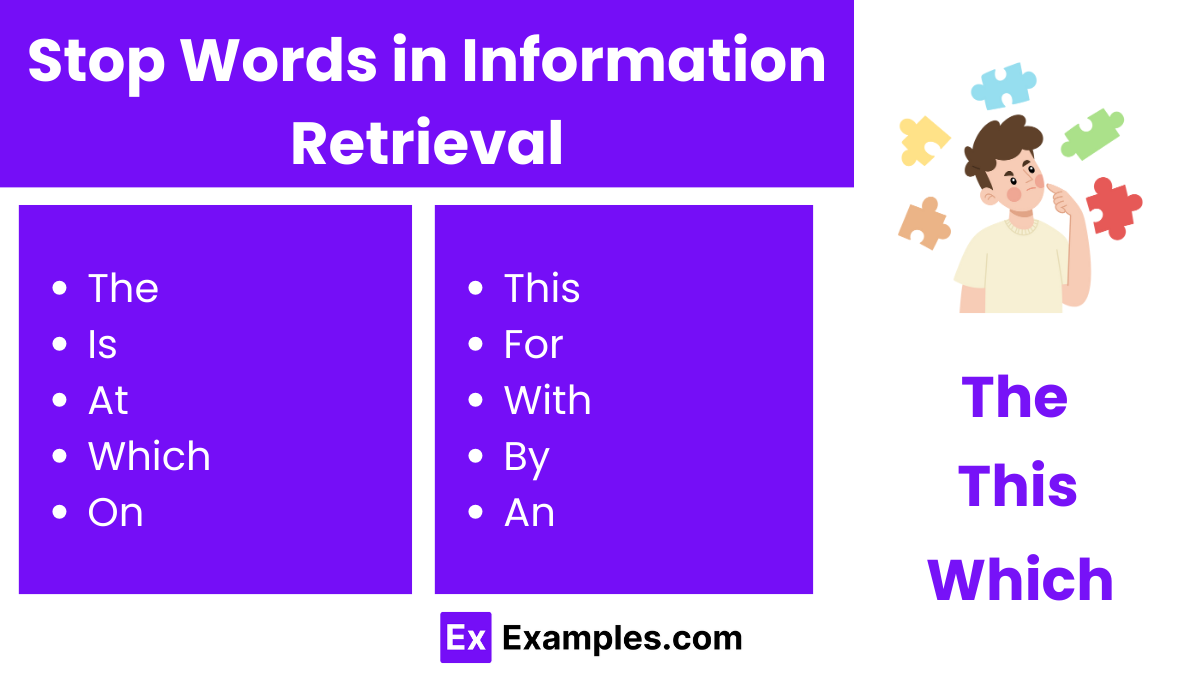Stop Words
Stop words are commonly used words in a language that are often filtered out or ignored in natural language processing (NLP) and search engine queries due to their high frequency and low informational content. Examples include “the,” “is,” “at,” “which,” and “on.” These words are considered to be of little value in retrieving meaningful information or in understanding the semantic context of text. By removing stop words, algorithms and processes can focus on the more significant words that contribute to the understanding of text, improving efficiency in search results, data analysis, and language processing tasks.
Stop words can be used in a whole range of tasks and here are a few:
- Supervised machine learning – removing stop words from the feature space
- Clustering – removing stop words prior to generating clusters
- Information retrieval – preventing stop words from being indexed
- Text summarization– excluding stop words from contributing to summarization scores & removing stop words when computing ROUGE scores
Download List of Stop Words - PDF
100+ List of “Stop Words”
Stop words are a fundamental aspect of natural language processing and search engine optimization. These are the words that are often filtered out before processing textual data because they are deemed to be of little value in understanding the essence of content. Typically, these include common articles, conjunctions, and prepositions such as “the,” “and,” “but,” and “or.” While they are crucial for grammatical structure in language, their ubiquitous nature means they do little to distinguish one piece of text from another in analytical contexts.
| a | about | above | after |
| again | against | all | am |
| an | and | any | are |
| as | at | be | because |
| been | before | being | below |
| between | both | but | by |
| could | did | do | does |
| doing | down | during | each |
| few | for | from | further |
| had | has | have | having |
| he | her | here | hers |
| him | himself | his | how |
| i | if | in | into |
| is | it | its | itself |
| just | me | more | most |
| my | myself | no | nor |
| not | now | of | off |
| on | once | only | or |
| other | our | ours | out |
| over | own | same | she |
| should | so | some | such |
| than | that | the | their |
| theirs | them | then | there |
| these | they | this | those |
| through | to | too | under |
| until | up | very | was |
| we | were | what | when |
| where | which | while | who |
| whom | why | will | with |
| you | your | yours | yourself |
Types of Stop Words
Stop words can be categorized based on their role and function in language. Here are some types of stop words:
- Articles: These include words like “a,” “an,” and “the.” They are used to define a noun as specific or unspecific, but often don’t add significant meaning in text analysis.
- Conjunctions: Words like “and,” “but,” “or,” “for,” “nor,” “so,” and “yet” connect phrases, clauses, or words. While they’re essential for grammatical structure, they usually carry little meaning on their own in the context of text processing.
- Prepositions: These are words that show the relationship of a noun or pronoun to another word in the sentence, such as “in,” “at,” “by,” “from,” “with,” “about,” and “against.” In many analytical processes, these words are considered non-essential.
- Pronouns: Words like “he,” “she,” “it,” “they,” “you,” “we,” and possessive pronouns like “your,” “their,” “our,” etc., are often filtered out as they’re common and usually don’t contribute to the distinctiveness of a text.
- Auxiliary Verbs: Also known as helping verbs, these include words like “be,” “is,” “are,” “was,” “were,” “do,” “does,” “did,” “have,” “has,” “had.” They offer grammatical support to main verbs but are often removed in text mining.
- Adverbs: Especially common adverbs like “very,” “just,” “too,” “also,” “then,” and “there.” While they modify verbs, adjectives, or other adverbs, they often add minimal additional meaning in the context of data analysis.
- Quantifiers: Words that denote quantity, like “some,” “any,” “few,” “more,” “much,” “each,” “every,” etc. These words can be less informative for understanding the context or sentiment of a text.
- Interjections: Words like “oh,” “wow,” “hey,” and others that express emotion or sentiment but typically do not carry significant meaning when analyzing text content.
- Common Verbs and Adjectives: High-frequency verbs like “get,” “go,” “make,” and adjectives like “good,” “big,” “able” can sometimes be treated as stop words because they’re overly generic
Stop Words for Sentiment Analysis
Sentiment analysis leverages natural language processing to determine the emotional tone behind words. In this context, certain stop words might be excluded to focus on keywords that more strongly indicate sentiment. However, some stop words can contribute to understanding nuances in sentiment and should be considered carefully in analysis.
- Not – Used to make a word or sentence negative.
- But – Used to introduce something contrasting.
- No – Used to give a negative response.
- Very – Used for emphasis.
- Too – To a higher degree than desired.
- Just – Exactly or precisely.
- So – To such a great extent.
- Only – And no one or nothing more besides.
- Really – Very or very much.
- However – Used to introduce a contrasting statement.
Stop Words in Information Retrieval
In information retrieval, stop words are filtered out before or after processing queries. Removing these words can improve search efficiency and relevance. The following list includes common stop words that, while necessary for grammatical structure, are often omitted to streamline search processes and improve the accuracy of search results.
- The – Definite article.
- Is – Third person singular present of “be.”
- At – Expressing location or arrival.
- Which – Asking for information specifying one or more.
- On – Positioned at the surface.
- This – Used to identify a specific person or thing.
- For – Indicating the purpose of an object or action.
- With – Accompanied by another person or thing.
- By – Identifying the agent performing an action.
- An – Indefinite article before a vowel sound.
List of “A” Stop Words
| a | about |
| above | after |
| again | against |
| all | am |
| an | and |
| any | are |
| as | at |
List of “B” Stop Words
| be | because |
| been | before |
| being | below |
| between | both |
| but | by |
List of “C” Stop Words
| can | cannot |
| could | can’t |
| couldn’t |
List of “D” Stop Words
| do | does |
| did | didn’t |
| doing | don’t |
List of “E” Stop Words
| each | either | else |
List of “F” Stop Words
| for | from |
| few | further |
List of “G” Stop Words
| get | got |
| gets | getting |
List of “H” Stop Words
| had | hadn’t |
| has | hasn’t |
| have | haven’t |
| having | he |
| he’d | he’ll |
| he’s | her |
| here | here’s |
| hers | herself |
| him | himself |
| his | how |
| how’s |
List of “I” Stop Words
| I | I’d |
| I’ll | I’m |
| I’ve | if |
| in | into |
| is | isn’t |
| it | it’s |
| its | itself |
List of “K” Stop Words
| keep | keeps |
| kept | knowing |
| known | knows |
List of “L” Stop Words
| last | lately |
| later | least |
| less | let |
| let’s | like |
| likely | little |
| look | looking |
| looks |
List of “M” Stop Words
| many | may |
| me | mean |
| meanwhile | might |
| mine | more |
| most | mostly |
| much | must |
| my | myself |
List of “N” Stop Words
| name | namely |
| nd | near |
| nearly | necessary |
| need | needs |
| neither | never |
| new | next |
| no | nobody |
| non | noone |
| nor | normally |
| not | nothing |
| novel | now |
| nowhere |
List of “O” Stop Words
| obviously | of |
| off | often |
| oh | ok |
| okay | old |
| on | once |
| one | ones |
| only | onto |
| or | other |
| others | otherwise |
| ought | our |
| ours | ourselves |
| out | outside |
| over | overall |
| own |
List of “P” Stop Words
| particular | particularly |
| per | perhaps |
| placed | please |
| plus | possible |
| presumably | probably |
| provides |
List of “R” Stop Words
| rather | rd |
| re | really |
| reasonably | regarding |
| regardless | regards |
| relatively | respectively |
| right |
List of “S” Stop Words
| said | same |
| saw | say |
| saying | says |
| second | secondly |
| see | seeing |
| seem | seemed |
| seeming | seems |
| seen | self |
| selves | sensible |
| sent | serious |
| seriously | seven |
| several | shall |
| she | should |
| shouldn’t | since |
| six | so |
| some | somebody |
| somehow | someone |
| something | sometime |
| sometimes | somewhat |
| somewhere | soon |
| sorry | specified |
| specify | specifying |
| still | sub |
| such | sup |
| sure |
List of “T” Stop Words
| take | taken |
| tell | tends |
| th | than |
| thank | thanks |
| thanx | that |
| thats | the |
| their | theirs |
| them | themselves |
| then | thence |
| there | theres |
| therefore | therein |
| theres | thereupon |
| these | they |
| theyd | theyll |
| theyre | theyve |
| think | third |
| this | thorough |
| thoroughly | those |
| though | three |
| through | throughout |
| thru | thus |
| to | together |
| too | took |
| toward | towards |
| tried | tries |
| truly | try |
| trying | ts |
| twice | two |
List of “U” Stop Words
| un | under |
| unfortunately | unless |
| unlikely | until |
| unto | up |
| upon | us |
| use | used |
| useful | uses |
| using | usually |
List of “W” Stop Words
| want | wants |
| was | wasnt |
| way | we |
| welcome | well |
| went | were |
| werent | what |
| whats | whatever |
| when | whence |
| whenever | where |
| whereafter | whereas |
| whereby | wherein |
| whereupon | where’s |
| wherever | whether |
| which | while |
| whither | who |
| who’s | whoever |
| whole | whom |
| whomever | whose |
| why | will |
| willing | wish |
| with | within |
| without | wont |
| wonder | would |
| would | wouldnt |
List of “Y” Stop Words
| yes | yet |
| you | youd |
| youll | your |
| youre | yours |
| yourself | yourselves |
| youve |
In conclusion, understanding stop words is pivotal for refining content and enhancing its relevance in search engines and text analyses. By strategically managing these common but less significant words, we can craft clearer, more focused communications. This knowledge empowers educators and writers alike to optimize their content for better engagement and effectiveness, making every word count in their narratives






